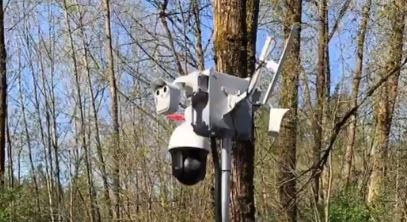Opponents of the Trans Mountain pipeline expansion project were sounding the alarm on the weekend when a surveillance camera they dubbed the “monster eye” was erected in Burnaby.
The camera – pictured above and in video below – was assembled right near some nests used by Anna’s Hummingbirds along the Brunette River. Trans Mountain has been cutting trees in the area.
The camera was surrounded by fencing and three security guards. And then, suddenly, it was taken down on Sunday, according to multiple sources who have been keeping their own eye on the site each day.
The NOW contacted Trans Mountain on Saturday for comment, but has not received a response or an explanation of why the device was installed.
Trans Mountain was recently granted the ability to circumvent a section of the City of Burnaby’s tree bylaw, which requires a permit for anyone to damage or cut down any protected tree – those with 20.3-centimetre diameters or larger – in the city. However, the order, which came from the Canada Energy Regulator, said the project needed to comply with all other sections of the bylaw. Trans Mountain plans to cut down 1,308 protected trees in Burnaby, not including trees with smaller trunks.
Today’s update from treehouse day 257:
— Lozan (@Lozan72) April 17, 2021
THE #TMX EYE 👁 MONSTER is assembled, functioning & guarded with 3 guards (one of them 😂 volunteered to tell us he is 27 years police veteran)
All jokes aside, this is freaking scary & dangerous with gasoline canisters in the woods 🤔 pic.twitter.com/W7N4L8xMMc
On Monday, April 12, two federal wildlife officers visited the TMX work site at the Brunette River Conservation Area following a tip from a local activist group called the Community Nest Finding Network (CNFN). Specifically, that tip was regarding an Anna’s Hummingbird nest CNFN had identified days prior and believed was at risk of being destroyed by the crown corporation’s logging.
Sara Ross, co-founder of CNFN went with the officers into the work site and she says her suspicions were confirmed while the officers inspected the area.
“I was very sad to discover this loss,” Ross said. “These tiny and fierce birds symbolize hope for many people and cultures. To witness nests being directly threatened and damaged by a tar sands expansion project... is a disgrace.”
Upon this discovery, Ross says the wildlife officers ordered the cutting stopped and nearly a week later the clearing of the area has not resumed.
Justus Mirembe is the lead federal wildlife officer for the file who attended the work site on Monday. While he confirms there was an inspection conducted he did not say whether or not a federal investigation into the logging practices of Trans Mountain would be launched.
"At this point, we are monitoring all the activities that are going on over there and we are in the process of determining the way forward," Mirembe said.
- With additional reporting by Cameron Thomson



